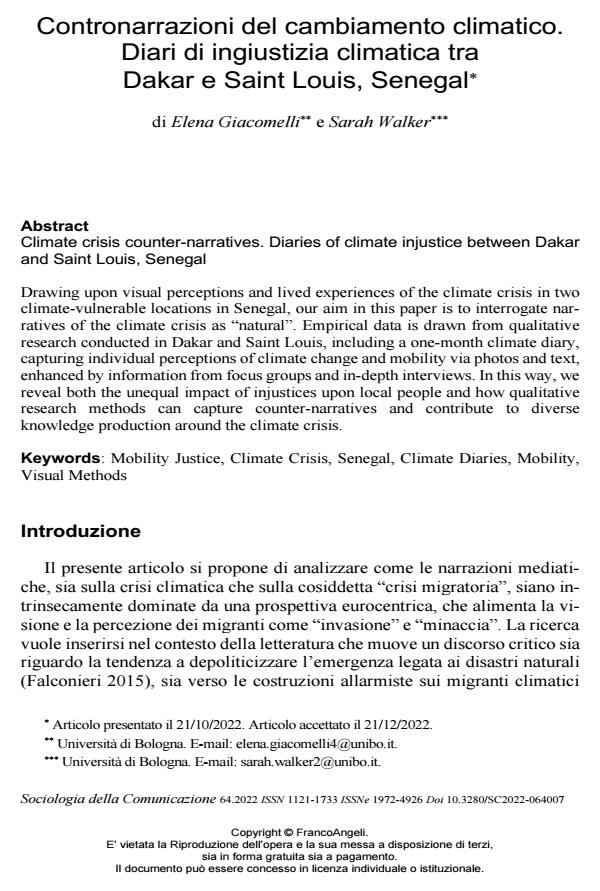Contronarrazioni del cambiamento climatico. Diari di ingiustizia climatica tra Dakar e Saint Louis, Senegal
Titolo Rivista SOCIOLOGIA DELLA COMUNICAZIONE
Autori/Curatori Elena Giacomelli, Sarah Walker
Anno di pubblicazione 2023 Fascicolo 2022/64
Lingua Italiano Numero pagine 20 P. 121-140 Dimensione file 404 KB
DOI 10.3280/SC2022-064007
Il DOI è il codice a barre della proprietà intellettuale: per saperne di più
clicca qui
Qui sotto puoi vedere in anteprima la prima pagina di questo articolo.
Se questo articolo ti interessa, lo puoi acquistare (e scaricare in formato pdf) seguendo le facili indicazioni per acquistare il download credit. Acquista Download Credits per scaricare questo Articolo in formato PDF

FrancoAngeli è membro della Publishers International Linking Association, Inc (PILA), associazione indipendente e non profit per facilitare (attraverso i servizi tecnologici implementati da CrossRef.org) l’accesso degli studiosi ai contenuti digitali nelle pubblicazioni professionali e scientifiche.
Drawing upon visual perceptions and lived experiences of the climate crisis in two climate-vulnerable locations in Senegal, our aim in this paper is to interrogate narratives of the climate crisis as "natural". Empirical data is drawn from qualitative research conducted in Dakar and Saint Louis, including a one-month climate diary, capturing individual perceptions of climate change and mobility via photos and text, enhanced by information from focus groups and in-depth interviews. In this way, we reveal both the unequal impact of injustices upon local people and how qualitative research methods can capture counter-narratives and contribute to diverse knowledge production around the climate crisis.
Parole chiave:Mobility Justice, Climate Crisis, Senegal, Climate Diaries, Mobility, Visual Methods
- Climate Mobility Justice Elena Giacomelli, Pierluigi Musarò, pp.165 (ISBN:978-3-032-07906-0)
- Encountering mobility (in)justice through the lived experiences of fishing communities in Dakar and Saint Louis, Senegal Sarah Walker, Elena Giacomelli, in Mobilities /2024 pp.955
DOI: 10.1080/17450101.2024.2334705
Elena Giacomelli, Sarah Walker, Contronarrazioni del cambiamento climatico. Diari di ingiustizia climatica tra Dakar e Saint Louis, Senegal in "SOCIOLOGIA DELLA COMUNICAZIONE " 64/2022, pp 121-140, DOI: 10.3280/SC2022-064007